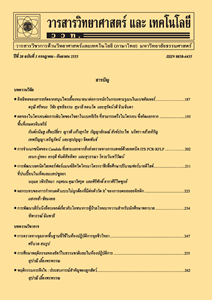พฤติกรรมธรรมชาติ : สวัสดิภาพในสุกรและไก่
Main Article Content
Abstract
บทคัดย่อ
พฤติกรรมธรรมชาติหมายถึงองค์ประกอบทางพฤติกรรมที่เกิดขึ้นจากการปรับตัว ซึ่งค่อย ๆ ปรากฏขึ้นมาระหว่างกระบวนการวิวัฒนาการของสัตว์สปีชีส์นั้น หรือในระหว่างกระบวนการปรับเปลี่ยนจากสัตว์ป่ามาเป็นสัตว์เลี้ยง การปรับตัวดังกล่าวเพื่อเพิ่มความแข็งแรงทางชีววิทยาของสัตว์ที่แสดงพฤติกรรมนั้น นักวิทยาศาสตร์ด้านสวัสดิภาพไม่ได้จำแนกให้พฤติกรรมธรรมชาติทุกประเภทจำเป็นต้องถูกแสดงออกมาทั้งหมดภายใต้สภาพกักขัง แต่ได้พยายามแยกแยะออกเป็นกลุ่มพฤติกรรมย่อยที่สัตว์แสดงออกมาแล้วส่งผลดีต่อสวัสดิภาพของมัน เนื่องจากพฤติกรรมนั้นเกิดจากแรงจูงใจในระดับสูงซึ่งยังคงปรากฏให้เห็นถึงแม้ว่าจะอยู่ในสภาพกักขัง ภาวะขาดพฤติกรรมไม่เพียงแค่บอกเป็นนัยว่าสัตว์ถูกขัดขวางในการแสดงพฤติกรรม แต่ยังส่งผลในทางลบกับสัตว์ด้วย โดยทั่วไปการแสดงพฤติกรรมของสัตว์ถูกควบคุมทั้งจากปัจจัยภายในและภายนอก พฤติกรรมบางประเภทอาจถูกชักนำเบื้องต้นจากปัจจัยภายใน อย่างไรก็ตาม บางปัจจัยมิได้เกิดจากตัวสัตว์เพียงอย่างเดียว แต่อาจเกิดจากปฏิสัมพันธ์ที่ซับซ้อนระหว่างปัจจัยภายในและภายนอก การเพิ่มคุณค่าชีวิตด้วยสภาพแวดล้อมเป็นการเพิ่มสิ่งที่มีคุณลักษณะเฉพาะทางชีววิทยาให้กับสภาพแวดล้อมของสัตว์เพื่อสนับสนุน และกระตุ้นให้สัตว์แสดงพฤติกรรมธรรมชาติ รวมทั้งเปิดโอกาสให้สัตว์แสดงพฤติกรรมออกมาได้หลากหลาย คุณประโยชน์ที่ปศุสัตว์ได้รับจากการเพิ่มคุณค่าชีวิตด้วยสภาพแวดล้อมมีมากมาย งานวิจัยแสดงให้เห็นอย่างชัดเจนว่าพฤติกรรมธรรมชาติบางประเภทเกิดจากแรงจูงใจที่สูงกว่าพฤติกรรมอื่น เมื่อสัตว์ไม่สามารถแสดงออกมาได้จะส่งผลต่อพฤติกรรม สรีรวิทยาและสวัสดิภาพของสัตว์ นักพฤติกรรมวิทยาเห็นพร้องต้องกันว่าในสภาพการเลี้ยงแบบประณีตควรให้สัตว์ได้แสดงพฤติกรรมนั้นออกมา ดังนั้นในทางปฏิบัติการเปิดโอกาสให้สัตว์ฟาร์มแสดงพฤติกรรมธรรมชาติอาจเป็นวิธีการที่มีประสิทธิภาพในการปรับปรุงสวัสดิภาพของมัน ตัวอย่างพฤติกรรมธรรมชาติ ได้แก่ การสร้างรังของแม่สุกรก่อนคลอด การเกาะคอนและการอาบฝุ่นในไก่ ซึ่งได้อภิปรายไว้ในบทความนี้
คำสำคัญ : สุกร; ไก่; สวัสดิภาพสัตว์; พฤติกรรมธรรมชาติ; การเพิ่มคุณค่าชีวิตด้วยสภาพแวดล้อม
Abstract
Natural behaviour is those behavioural elements and their sequence that are adaptive, i.e., that have evolved either during the evolution of the species or during its domestication in order to increase the biological fitness of the behaving animal. However welfare scientists, do not catalogue all natural behaviours to try and ensure that each is performed in captivity. Instead, they try to identify the subset whose performance is likely to benefit welfare, because driven by high motivations that still occur in captivity: ‘behavioural deprivation’ implied not only that an animal is prevented from performing behaviour but that adverse effects arise as a result. All behaviour is both internally and externally controlled. Nevertheless, when the proximate factors governing the immediate expression of particular behaviour patterns are considered, it is clear that some are triggered primarily from within the animal, some from without the animal, and others by complex interactions between the two. Environmental enrichment can be defined as the addition of biologically relevant features to animals’ environment that foster and encourage natural behaviours and generally create a greater number of behavioural opportunities. The benefits of enrichment to livestock are numerous. Research clearly shows that some natural behaviours are more highly motivated than others and that when animals are unable to perform them, there can be behavioural, physiological and welfare consequences, Most ethologists agree that these type of highly motivated behaviours should be accommodated when livestock are housed in intensive systems. In short, the opportunity to perform natural behaviour may be an effective way improves farm animal welfare in practice. The examples of natural behaviour, i.e. nest building in pre-farrowing sows, perching and dust-bathing behaviour in chickens are discussed.
Keywords: pig; chicken; animal welfare; natural behavior; environmental enrichment


